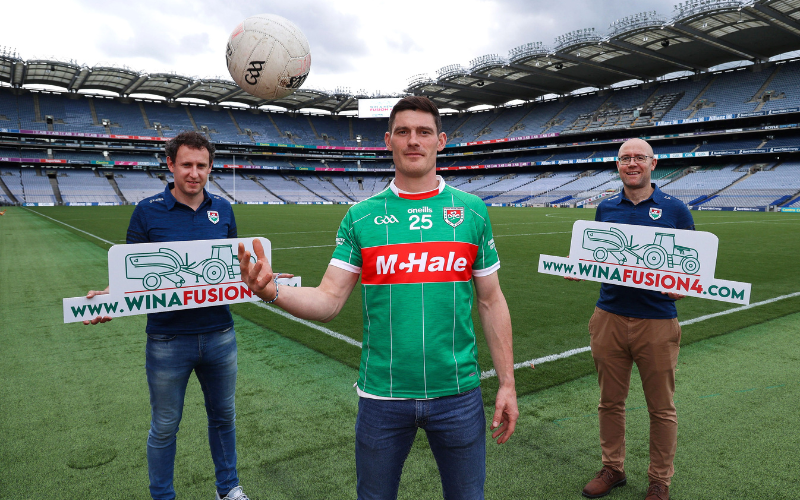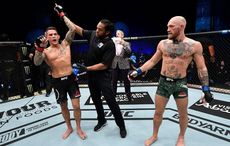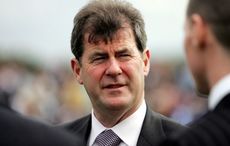View our photo gallery of Irish fans celebrating the huge win
Irish fans celebrated around the world today as Ireland won the rugby Grand Slam for the first time since 1948.
Whether it was the glassy-eyed supporters who stayed up all night in Sydney or bleary-eyed fans that got out of the bed at the crack of dawn in Honolulu to watch the game, the roar that greeted Stephen Jones missing the last minute penalty for Wales could be heard round the globe.
Ireland claimed only their second ever Grand Slam with a quite dramatic 17-15 victory over defending champions Wales in Cardiff on Saturday evening.
Stephen Jones appeared to have won the game – and the Triple Crown – for Wales when he slotted over a drop goal with just five minutes remaining.
However, Ronan O’Gara responded in kind just moments later to edge Ireland back in front.
It was to go right to the last kick of the game, though, with Wales being awarded a penalty just inside Irish territory in the dying seconds.
Jones stepped up to take it, but his kick fell just short and Ireland had completed a Championship clean sweep for the first time since 1948.
Their achievement was made all the more remarkable for the fact that only 12 months ago Ireland had endured their worst finish in the tournament since its expansion to include Italy in 2000.
However, the arrival of Declan Kidney, a two-time Heineken Cup winner with Munster, has undoubtedly proven crucial.
Indeed, it was he who deserves most credit for managing to inspire Ireland’s ‘Golden Generation’ to realise a potential that many feared might go unfulfilled.
Of course, the triumph was probably made all the sweeter for the fact that it had come after a week in which Wales boss Warren Gatland had claimed that his players ‘dislike’ their Irish counterparts more than any other side in the Championship.
That ‘revelation’ was unsurprisingly laughed off by the Irish camp, yet there was no doubting that both sides carried a certain edge into the game.
Indeed, there was a fracas with less than 60 seconds on the clock, Donncha O’Callaghan taking offence to a late trip by Ryan Jones on Ronan O’Gara.
It might not have been malicious but it was certainly a statement of intent by the Ospreys back row: Ireland would not be allowed to take Wales’ Champions crown without a fight.
And O’Gara failed to punish Jones’ indiscretion, dragging an admittedly difficult penalty attempt from close to the right touchline just to the left of the posts.
The game continued in a disappointingly niggly manner. It was fast and it was frenetic. The battle at the breakdown was particularly intense, with the opening 15 minutes yielding a succession of turnovers.
Horan was responsible for what was nearly a very significant one on 13 minutes, stripping Stephen Jones of possession on halfway and thus allowing Tomas O’Leary placing a beautifully-measured kick in behind the Welsh back-line.
Ireland put immense pressure on the line-out which followed and eventually forced Shane Williams into the concession of a scrum five metres out from their own line.
Ireland retained possession, worked it wide and Luke Fitzgerald planted the ball firmly in the corner. However, the pass which put him over, from O’Driscoll, was quite rightly ruled forward.
Wales were under pressure. They responded with some menacing breaks from Byrne and Phillips but it was Ireland who were controlling the game, if such a thing was possible in such a frenetic encounter.
O’Gara’s demeanour remained a worry, the ten perhaps rattled by his unsettling start to the game, but O’Connell was proving imperious in the air.
No points were forthcoming, though. Wales were proving impenetrable.
Ireland’s frustration was obvious and it manifested itself in costly penalties.
Jones kicked Wales deep into Irish territory after Jerry Flannery had infringed at a ruck in midfield. The Wales out-half then opened the scoring from some 30 metres out after Ireland’s second rows cough up a penalty at the subsequent line-out.
Jones then doubled the home side’s advantage with another sweet swing of his right boot just before the interval. This time Ireland were somewhat unfortunate, in that Luke Fitzgerald had been pinged for inadvertently blocking a runner as he tried to make an angle for the advancing O’Gara, but that was of little concern to the Welsh.
Despite losing one of their most potent attacking players in Lee Byrne to injury on the half hour, they were six points to the good at the interval, just seven away from nicking the Championship.
Ireland needed to score next and they made a hugely encouraging start. Bowe broke free down the right. O’Gara switched play to the right wing and Jones, under pressure, had to carry it into touch.
Ireland claimed the line-out and then battered the Welsh line until O’Driscoll, in a manner eerily similar to his try against England in round three, wormed his way over, scraping the whitewash with the ball.
O’Gara converted and Ireland were ahead.
How would Wales respond? They did not get a chance to. Ireland claimed the restart and moments later, Bowe was diving over under the posts after being picked out by a sublime cross-field kick from O’Gara.
O’Gara added the extras once again and Ireland had gone from six points down to eight points up.
Wales needed a boost. Ireland gave them one, needlessly giving away a penalty at a Welsh line-out from which Jones – with the aid of the left post – managed to make it a one-score game once again.
Ireland’s mettle was now being tested again – as was their discipline. This was a time for cool heads but the men in green were losing theirs.
Jamie Heaslip took out a support jumper at a line-out and Jones stroked over another penalty to cut the gap to two.
The momentum had undoubtedly shifted again. Ireland had to up the ante. And they did. Bowe was put clear by another chip but after trying to lob the ball over Henson’s head, he was then penalised for a push on the Ospreys man and Wales were let off the hook.
Ireland continued to press, forcing the issue but then more ill-discipline at the breakdown – Hayes going off his feet - presented Henson with his big moment: a chance to edge Wales back in front with a long-range penalty.
The perma-tanned centre’s kick came up short, though, and Ireland had just ten more minutes to negotiate.
However, with just five minutes remaining, they seemingly cracked.
Phillips broke through four tackles, taking Wales deep into the Irish 22. The home side retained possession, eventually working enough time and space for Jones to slot over a drop goal to seemingly end Ireland's history-making hopes.
But then Jones, the man who had put Wales within touching distance of the Triple Crown, kicked the ball straight into touch just after the restart.
It gave Ireland hugely advantageous field position and they capitalised on it, taking the ball through a number of phases before Stringer fed O’Gara, who had dropped into the pocket.
Never a man to disappoint when the big moments come around, the Corkonian’s strike was true and Ireland were back in front.
Jones had one final chance to nick it for Wales but he could not deny this Irish side what has long been considered their destiny.
Wales: Lee Byrne; Mark Jones, Tom Shanklin, Gavin Henson, Shane Williams; Stephen Jones, Mike Phillips; Gethin Jenkins, Matthew Rees, Adam Jones; Ian Gough, Alun-Wyn Jones; Ryan Jones (capt), Martyn Williams, Andy Powell.
Replacements: Huw Bennett, John Yapp, Luke Charteris, Dafydd Jones, Warren Fury, James Hook, Jamie Roberts.
Ireland: Rob Kearney, Tommy Bowe, Brian O'Driscoll (capt), Gordon D'Arcy, Luke Fitzgerald, Ronan O'Gara, Tomás O'Leary, Marcus Horan, Jerry Flannery, John Hayes, Donncha O'Callaghan, Paul O'Connell, Stephen Ferris, David Wallace, Jamie Heaslip.
Replacements: Rory Best, Tom Court, Mick O'Driscoll, Denis Leamy, Peter Stringer, Paddy Wallace, Geordan Murphy.




Comments